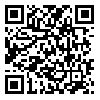Volume 64, Issue 8 (13 2006)
Tehran Univ Med J 2006, 64(8): 14-21 |
Back to browse issues page
Download citation:
BibTeX | RIS | EndNote | Medlars | ProCite | Reference Manager | RefWorks
Send citation to:



BibTeX | RIS | EndNote | Medlars | ProCite | Reference Manager | RefWorks
Send citation to:
Haji Abdolbaghi M, Makarem J, Rasoolinejad M, Afahami Sh, Fazeli Ms, Unesian M, et al . Evaluation of two surveillance methods for surgical site infection. Tehran Univ Med J 2006; 64 (8) :14-21
URL: http://tumj.tums.ac.ir/article-1-919-en.html
URL: http://tumj.tums.ac.ir/article-1-919-en.html
Haji Abdolbaghi M * 
 , Makarem J
, Makarem J 
 , Rasoolinejad M
, Rasoolinejad M 
 , Afahami Sh
, Afahami Sh 
 , Fazeli Ms
, Fazeli Ms 
 , Unesian M
, Unesian M 
 , Adili F
, Adili F 
 , Alavi S. SH
, Alavi S. SH 


 , Makarem J
, Makarem J 
 , Rasoolinejad M
, Rasoolinejad M 
 , Afahami Sh
, Afahami Sh 
 , Fazeli Ms
, Fazeli Ms 
 , Unesian M
, Unesian M 
 , Adili F
, Adili F 
 , Alavi S. SH
, Alavi S. SH 

Abstract: (8786 Views)
Background: Surgical wound infection surveillance is an important facet of hospital infection control processes. There are several surveillance methods for surgical site infections. The objective of this study is to evaluate the accuracy of two different surgical site infection surveillance methods.
Methods: In this prospective cross sectional study 3020 undergoing surgey in general surgical wards of Imam Khomeini hospital were included. Surveillance methods consisted of review of medical records for postoperative fever and review of nursing daily note for prescription of antibiotics postoperatively and during patient’s discharge. Review of patient’s history and daily records and interview with patient’s surgeon and the head-nurse of the ward considered as a gold standard for surveillance.
Results: The postoperative antibiotic consumption especially when considering its duration is a proper method for surgical wound infection surveillance. Accomplishments of a prospective study with postdischarge follow up until 30 days after surgery is recommended.
Conclusion: The result of this study showed that postoperative antibiotic surveillance method specially with consideration of the antibiotic usage duration is a proper method for surgical site infection surveillance in general surgery wards. Accomplishments of a prospective study with post discharge follow up until 30 days after surgery is recommended.
Methods: In this prospective cross sectional study 3020 undergoing surgey in general surgical wards of Imam Khomeini hospital were included. Surveillance methods consisted of review of medical records for postoperative fever and review of nursing daily note for prescription of antibiotics postoperatively and during patient’s discharge. Review of patient’s history and daily records and interview with patient’s surgeon and the head-nurse of the ward considered as a gold standard for surveillance.
Results: The postoperative antibiotic consumption especially when considering its duration is a proper method for surgical wound infection surveillance. Accomplishments of a prospective study with postdischarge follow up until 30 days after surgery is recommended.
Conclusion: The result of this study showed that postoperative antibiotic surveillance method specially with consideration of the antibiotic usage duration is a proper method for surgical site infection surveillance in general surgery wards. Accomplishments of a prospective study with post discharge follow up until 30 days after surgery is recommended.
| Rights and permissions | |
 |
This work is licensed under a Creative Commons Attribution-NonCommercial 4.0 International License. |



